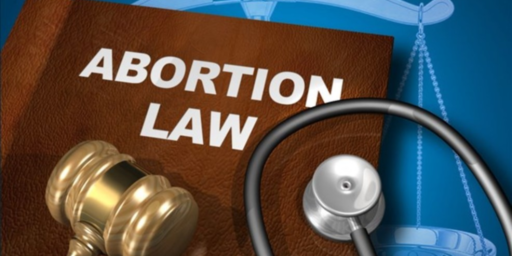Alabama Sex Toy Ban Upheld
The 11th Circuit has yet again upheld Alabama’s statute making it “unlawful for any person to knowingly distribute any obscene material or any device designed or marketed as useful primarily for the stimulation of human genital organs.” [Opinion PDF.] Michael Hayes reports that conflicting rulings on this matter in other states might ultimately force the Supreme Court to weigh in.
Colorado, Kansas and Louisiana courts have all said that laws banning the sale of sex toys on obscenity grounds are unconstitutional. Courts in Georgia, Mississippi and Texas have upheld sex toy bans. As those cases work their way through the federal appellate ranks, a split in the circuits would likely compel the U.S. Supreme Court to hear a sex toy case.
I think that’s right.
Julian Sanchez argues such laws are obviously unconstitutional under the 1965 ruling in Griswold which created the privacy doctrine in striking down bans on the sale of contraceptives and especially the 2003 ruling in Lawrence establishing a right to homosexual sodomy among adults in private settings without monetary compensation.
While I think these laws are uncommonly silly, the 11th Circuit’s reasoning strikes me as quite solid. Localities have a “legitimate rational basis” for regulating public morality and therefore “the statute survives rational basis scrutiny.” Banning consensual sexual conduct among adults in the privacy of their homes did not meet that standard. Further, the ruling implies that the fact that “The statute does not prohibit the use, possession, or gratuitous distribution of sexual devices” is important. That is, it’s the sale of such devices that’s prohibited, not the resulting private activity.
States and localities have long been given incredible leeway over such matters. For example, the Supreme Court ultimately took a “community standards” approach to obscenity law, recognizing that different localities have different mores that must be respected. Things that might go unnoticed in San Francisco or Manhattan would shock the conscience in rural Mississippi or Pennsylvania’s Amish country.
The ability to make a living selling sex toys has much lower Constitutional standing than, say, speech. The latter is, after all, actually mentioned in the document. Yet the courts have permitted numerous carve-outs in which speech rights–which would appear absolute from the plain language of the 1st Amendment–must be balanced against other societal interests. There are all manner of words, for example, that are not permitted on the public airwaves and plenty of time, place, and manner restrictions on speech generally.






I don’t think the bar on certain words on the public airways would be upheld if re-litigated today (and it might, now that the fines have been increased).
As for the “you can’t sell it but you can use/possess/gratuitously distribute it” distinction, that doesn’t do much for me. Could, for example, a law that outlawed the sale of newspapers but not their use etc. be upheld? Or the sale of condoms? Or a ban on Doctors receiving remuneration for abortion? It just seems to be a too easy end run around constitutional rights to me.
Could, for example, a law that outlawed the sale of newspapers but not their use etc. be upheld?
No, but there’s a fundamental right to publish newspapers.
Or the sale of condoms?
Probably not, since the public health benefit would outweigh any conceivable rational basis.
Or a ban on Doctors receiving remuneration for abortion?
Not under a doctrine that says getting an abortion is a constitutional right. That makes it just a medical procedure.
It just seems to be a too easy end run around constitutional rights to me.
What constitutional rights? Is there a Dildo Clause to the Constitution?
Frankly, I’m not sure why anyone would go to Joe Bob’s Sex Toys Emporium, anyway. One would think buying online or via catalog would be much easier all around.
Well, I don’t think I would trust anyone named Joe Bob selling me a sex toy anyways. I picture Joe Bob as looking a lot like Denver Pyle, and Uncle Jesse selling sex toys is just wrong!
Localities have a “legitimate rational basis†for regulating public morality and therefore “the statute survives rational basis scrutiny.â€
What in gods name could be rational about selling somethnig that does no one harm? What possible morality, other then insufferable busybodyness, could be upheld by preventing someone from buying a dildo? What moral code is beiong breached, I mean even Leviticus doesn’t mention cock rings or Ben Wa balls.
Yet the courts have permitted numerous carve-outs in which speech rights—which would appear absolute from the plain language of the 1st Amendment—must be balanced against other societal interests.
Right, like the carve out where giveing a politician a bribe in the form of a “campaign donation” is some how “speech”.
Frankly, I’m not sure why anyone would go to Joe Bob’s Sex Toys Emporium, anyway.
well if it’s the only place in town to get strawberry flavored lube, dildo wash, or any other of life’s necessary sundries … what are you going to do?
Much like there’s no right “to make a living selling sex toys”, I don’t see a similar right to make a living selling newspapers, condoms, or performing abortions.
I’m not convinced that there is some “right to dildos” in the Constitution, but the idea that a law is constitutional because it only outlaws the sale of sex toys, implies that it wouldn’t be if it outlawed the use/possession/gratuitous distribution as well, which in turn implies that there is a constitutional right to sex toys possessed by individuals — and so to effectively cutoff that right by banning their sale shouldn’t be constituational either.
Don’t you have that backwards?
🙂
What possible morality, other then insufferable busybodyness, could be upheld by preventing someone from buying a dildo?
They’re not doing that; they’re preventing local sales. Presumably, they’re concerned about window displays, the type of people who might be attracted to the area, and that sort of thing.
I don’t see a similar right to make a living selling newspapers, condoms, or performing abortions.
Well, I’d say the 1st Amendment confers a right to sell newspapers. Roe essentially created on for abortions, saying that there was no compelling public interest in preventing them in the first two trimesters. I’m not sure if there’s any jurisprudence on condoms other than Griswold and Eisenstadt.
Don’t you have that backwards?
I don’t think so, no.
“What constitutional rights? Is there a Dildo Clause to the Constitution?”
I would argue that the Ninth Amendment qualifies.
Read the 9th Amendment again and then look at who is making the law in question.
Er I was thinking of the 10th Amendment. The 9th Amendment is the one that the courts abandoned long ago.
things that might go unnoticed in San Francisco or Manhattan would shock the conscience in rural Mississippi
Let’s just say that it’s true either way.
As with Ugh, I find the “they’re legal, you just can’t buy or sell them” bit to be absurd. Try that with Bibles and see where it gets ya.
As with the “public morality” shtick, which is in fact a “we don’t have to have a reason” argument, which by definition does not meet the rational basis test. What is “immoral” about a married couple using a vibrator to enhance orgasm? Can anyone explain that one?
(I keep waiting for the equal-protection argument to make an appearance, since the great majority of sex toys actually sold appear to be for women’s use.)
I love this line – the courts have abandonded the ninth amendment.
I’m not arguing that JohnG is wrong about that. I am just fascinated how, in general, all the strict constructionists never seem to bother about the plain words and meaning of that “inkblot”.
The Constitution does not confer rights. It grants certain powers to the Government. The Bill of Rights is just an added protection for certain basic rights – and the whole point of the ninth amendment is to drive home the point that, having a Bill of Rights, is not meant to imply that rights are limited to only those enumerated. Having rights is the default position – grounded in the notion of free people – to be trumped by government power only when there is an explicit grant of power to the government.
It is an ongoing mystery how so many conservatives speak so eloquently, at times, in defense of freedom, and yet inevitably interpret the basic principles of the Constitution in an authoritarian manner – such that we the people are not to have any rights unless they are explicitly enumerated in the Constitution.
Well, that’s because the 9th Amendment is applicable only to the Federal Government, as it has not been incorporated against the states through the 14th Amendment. Because these cases are almost invariably state cases and because the states are thought to retain the general police power, the question is flipped when it comes to seeing whether what they do is constitutional: is there anything in the constitution or its amendments that prohibits the states from doing X.
Ugh,
Thanks for your response. But it merely recounts the state of the law today, it doesnt explain why those who claim to love liberty are resistant to the incorporation. They seem stuck in what seems to me to be the old Southern tradition of having a state government free to be tyrannical over its citizens (and we know why this was so important to them), but an impotent federal government. So citizens are “free” relative to federal power, but acutally under the thumb of state government – a level of government that escapes from the fundamental reform of the American revolution (rights from the ‘creator” rather than from the government).
Tano – no argument there.
What is the whole purpose of the sex toy ban? Anybody who wants one can go to a state, that does not ban sex toys, and buy it there. Or simply go online and order whatever they want.
Sex toy sales is what the Internet was made for. It’s not like you’re trying them on, I hope.
Why would Alabama want to hurt local businesses? It’s not as if they have a booming economy in the first place.
The ban against sex toys is, basically, a local issue. It is not any different than local dry laws that ban sale of alcohol, or restrict it. And these laws may not apply exclusively to sex toys, particularly at the local level. The town I live in has decided there is no more need for dollar stores in the city limits and banned the opening of new ones; likewise, Detroit, which is next door, will not allow new gas stations to be built.
Yes I agree going to another state would be a viable option, but according to the wording that I see in this law, wouldn’t that also affect sales via the internet? If sales are not allowed in Alabama that would directly affect Internet sales as well. Considering this blows away the theory that is is based one a store front.